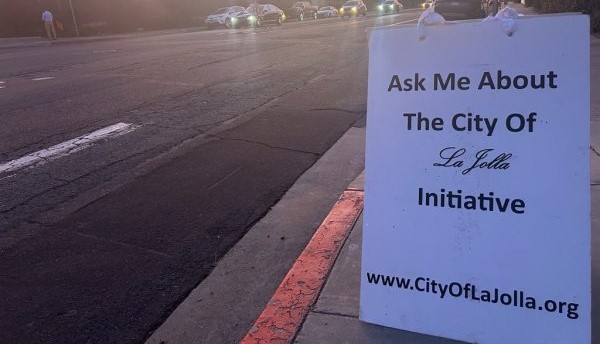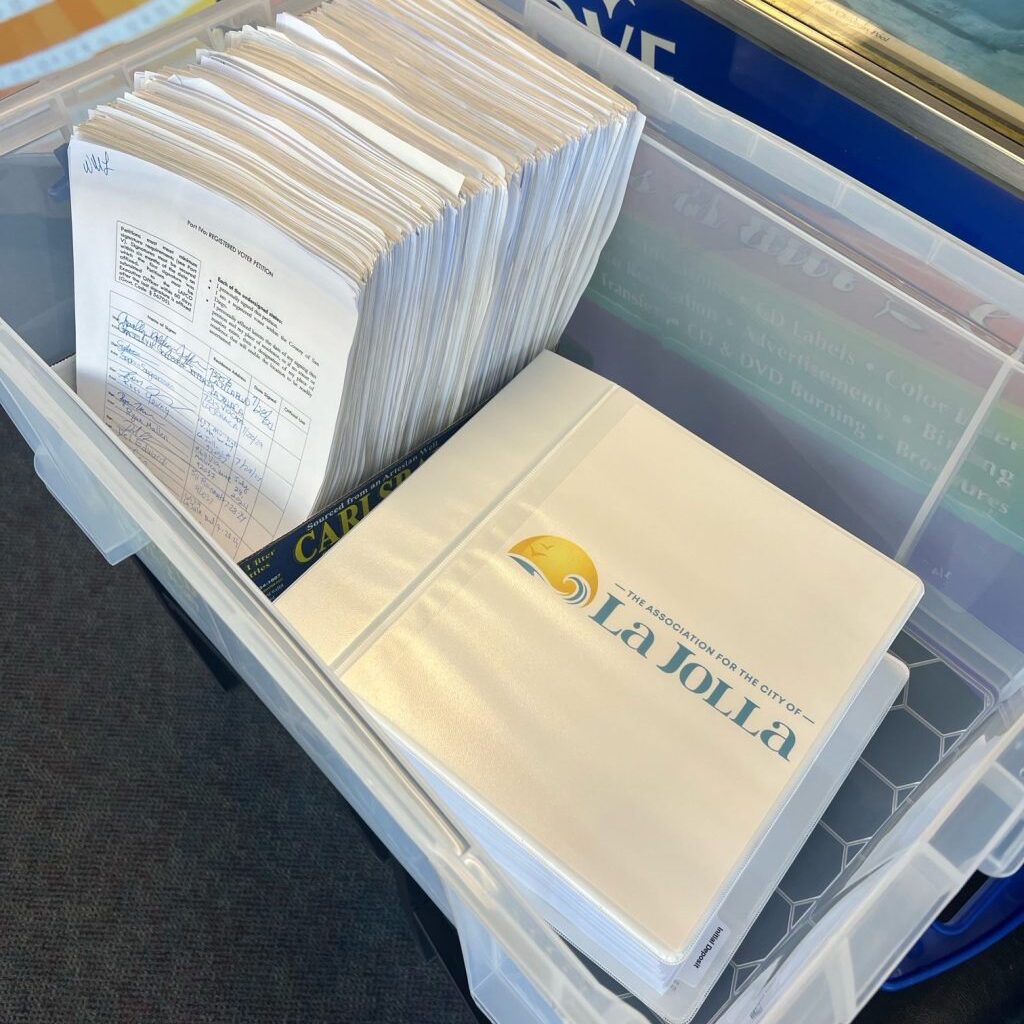The city of San Diego has amended its lawsuit challenging the ongoing effort to detach La Jolla from its mother city, arguing that a regional agency’s plans to proceed with the cityhood review process would impose “substantial irreparable harm” on San Diego due to the costs associated with staff time required for the next steps.
It further argues that dedicating staff members’ time to that process would take away from “performing their core functions.”
A representative of the San Diego city attorney’s office told the La Jolla Light that “amending a complaint is standard procedure, and in this case, it does not change the scope of the lawsuit.”
The representative said the office would not comment further.
The lawsuit, dated June 19 and filed in Superior Court in San Diego by City Attorney Heather Ferbert, seeks to stop the regional Local Agency Formation Commission and its executive officer, Keene Simonds, from proceeding with La Jolla’s cityhood process, including launching an administrative review of the application filed Jan. 29 by the Association for the City of La Jolla.
The dispute centers on LAFCO’s actions during the process of verifying petition signatures the association submitted in support of cityhood. LAFCO ultimately reversed the San Diego County registrar of voters office’s initial determination that ACLJ’s petition drive had failed to gather enough valid signatures from 25% of La Jolla’s registered voters, or 6,536, to continue the cityhood effort.
On April 29, LAFCO issued a “certificate of sufficiency” indicating that ACLJ had gathered the required signatures.
“The city brings this action as a result of [Simonds’] improper and legally unjustified determination that the Association for the City of La Jolla’s petition … contained the required number of valid signatures to initiate incorporation proceedings, as represented by the certificate of sufficiency,” the suit states.
It also declares that LAFCO “and all parties pursuant to their direction and control violated the law by issuing the certificate of sufficiency.”
It seeks “preliminary and permanent [court] injunctions ordering LAFCO and [Simonds] … to rescind the certificate of sufficiency” and issue a certificate of insufficiency indicating that the petition “was not signed by the requisite number of signers and enjoining LAFCO from continuing the proceedings.”
Should a certificate of insufficiency be issued, ACLJ would have to restart the petition process.
A court date for the case has not yet been scheduled.
The amendment to the suit, filed in late July, spells out ways in which San Diego contends it would be negatively impacted by what it sees as an invalid review of the cityhood application.
“Following the issuance of the certificate of sufficiency, LAFCO stated that it will proceed with initiating the administrative review of the proposed reorganization and will prepare a comprehensive fiscal analysis evaluating the ability of the proposed city of La Jolla to fund a sufficient level of municipal services while assessing the monetary impacts to the city of San Diego,” the amendment states.
“These further LAFCO proceedings and the preparation of the comprehensive fiscal analysis will impose substantial irreparable harm on the city. The city will be required to provide LAFCO with a significant amount of information and data from numerous city departments for LAFCO to prepare the comprehensive fiscal analysis. The city will incur considerable costs as city staff will be forced to expend substantial time and resources analyzing and collecting the necessary information and data.
“The city will also be injured by these further LAFCO proceedings as the analysis and collection of the information and data will prevent city staff from performing their core functions to provide services to the residents of the city of San Diego.”
 Signs were placed around La Jolla last year encouraging people to sign a petition supporting potential cityhood. (Mark Munoz)
Signs were placed around La Jolla last year encouraging people to sign a petition supporting potential cityhood. (Mark Munoz)
The Association for the City of La Jolla said in a statement this week that “ACLJ is disappointed [that] the city of San Diego decided to waste taxpayer dollars on a meritless lawsuit intended to silence the constitutional right of those who signed the ACLJ petition. ACLJ followed the legal process established for signature-gathering for its registered voter petition to initiate the process with [LAFCO] … to incorporate a new city of La Jolla. San Diego LAFCO also acted within its delegated authority from the state of California in making its determination that the ACLJ petition had the required number of registered voter signatures … to move forward. ACLJ is confident of resolution in our favor and looks forward to working with San Diego LAFCO in the months ahead.”
LAFCO has declined to comment about the lawsuit. But Simonds wrote earlier in a letter to San Diego Mayor Todd Gloria that certain claims the city made “appear to reflect a misunderstanding of the distinct responsibilities assigned to the [registrar of voters] and LAFCO in reviewing voter petitions for jurisdictional changes.”
In mid-December, the association submitted nearly 8,000 signatures to the registrar of voters office and LAFCO for review and validation.
However, the registrar of voters office said in March that the group fell 1,027 short of the number required because of signatures determined to be invalid or in need of information such as a date or an address.
LAFCO gave ACLJ from March 17 to April 1 to correct the invalid signatures, collect new ones or both to fill the gap. The group came up with 1,506.
In late April, the association received a letter saying it had collected a total of 6,772 valid signatures, putting it over the threshold.
Soon after, Gloria issued a formal objection arguing that LAFCO overstepped in the process of verifying the signatures, and he disputed many of the signatures that ultimately were deemed valid.
The city’s objection said “the [registrar of voters] reviewed both the petition and supplemental petition [the second round of signature-gathering] and found them insufficient, with a shortfall of 218 valid signatures.”
The city stated that ACLJ “requested to review the rejected signatures and contest those they believe the [registrar of voters] improperly rejected.”
LAFCO conducted a secondary review of the contested signatures on the supplemental petition and ultimately “overruled the [registrar’s] rejection on 239 signatures,” the city said.
Of the 239 “resurrected” signatures, the city said it was “allowed to review 212.” The city contended that of those, only 33 were valid, and it objected to the remaining 179.
The city also said it “objects to LAFCO’s secondary review of the signatures [ACLJ] contested” and believes the registrar of voters should be the authority on whether signatures are valid.
On May 2, LAFCO issued a formal response to San Diego’s objection, calling many of the city’s claims “inaccurate” and saying it was moving forward with the cityhood application process.
“[Applicable government regulations] clearly assign to the LAFCO executive officer the sole authority to determine the petition’s overall validity — including whether to issue a certificate of sufficiency or insufficiency,” Simonds wrote in his letter to Gloria.
Ten days later, the San Diego City Council decided on a 6-0 vote during a closed session to authorize legal action over LAFCO’s handling of the petition signatures.
“From the outset, I’ve made it clear that the city of San Diego has serious concerns about LAFCO’s exceptionally broad and questionable interpretations that led them to overturn the county registrar of voters’ official determination that the La Jolla secession petition was insufficient,” Gloria said at the time.
“The decision by LAFCO to overrule the registrar undermines public confidence in the integrity of this signature-verification process and sets a troubling precedent. This litigation aims to provide San Diegans with the transparency they deserve, hold LAFCO accountable for its arbitrary and capricious decisions and affirm the registrar’s original certification of insufficiency.”
On the other hand, the Association for the City of La Jolla’s legal counsel, Best Best & Krieger, argued in a letter soon after the lawsuit was filed that “unequivocally … the petition had the required number of signatures using only those signatures over which there is no dispute. Therefore, there is no factual basis for the city lawsuit’s claim that ACLJ did not gather the required valid signatures.” ♦
